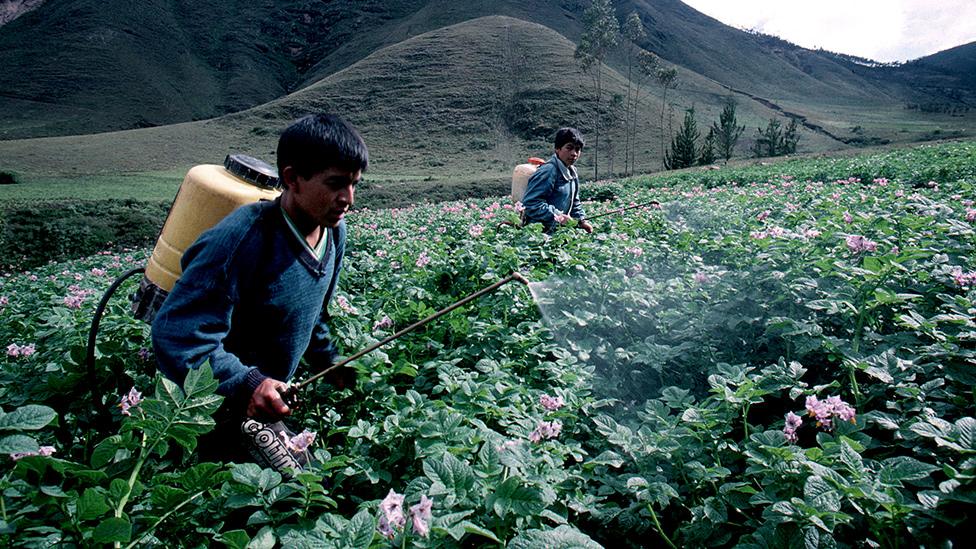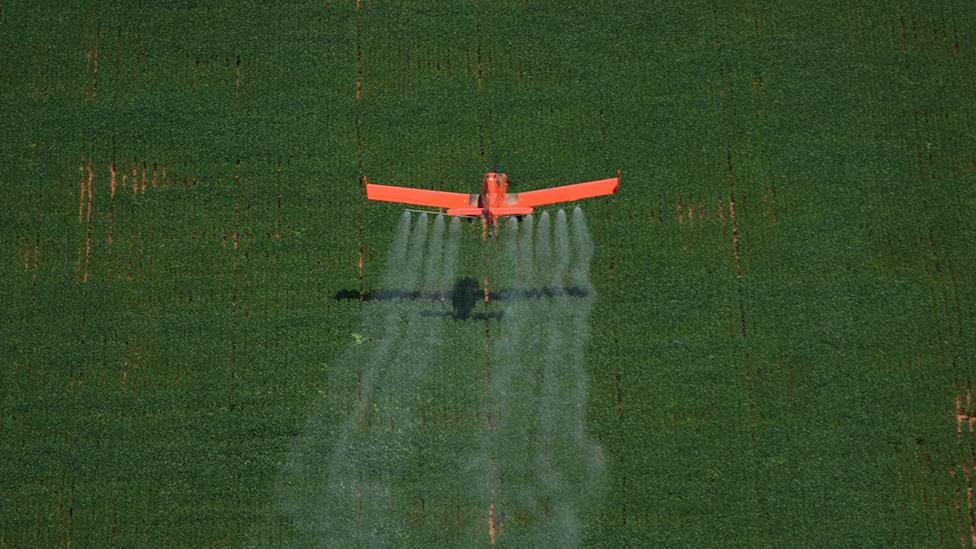UK 'operates double standards' on banned pesticides
- Published

Greenpeace says some destination countries don't use sufficient protective equipment
The UK approved the export of more than 32,000 tonnes of banned pesticides in 2018, according to environmental campaign group Greenpeace.
The shipments were among 81,615 tonnes of banned "crop protection products" planned by British and other European companies that year.
Under EU law, firms are still permitted to make and export chemicals whose use is restricted within the bloc itself.
Greenpeace used freedom of information requests to unearth the data.
This was contained in hundreds of documents.
The group said almost 40% of planned exports by weight came from the UK. The next-highest exporter was Italy, with 11% of planned exports, or 9,350 tonnes.
Greenpeace described the trade as "exploitative hypocrisy" and demanded the UK government put an end to it.
The campaign group's chief scientist, Doug Parr, said the UK should stop the manufacture and export of all banned pesticides and "pressure the EU to do the same and close this loophole for good".
'Double standard'
Some critics in importing nations claimed the practice was a "double standard" that placed a lower value on lives and ecosystems in poorer countries.
"Even though the climate is different, our bodies are made from the same matter," said Alan Tygel, spokesperson for the Permanent Campaign Against Pesticides and for Life, a Brazilian umbrella group of social movements and NGOs.
"Substances that are dangerous for Europeans, are also dangerous for Brazilians, Indians, Argentinians, and so on."
'Different' requirements
The majority of the exports notified from the UK (28,185 tonnes) were mixtures containing paraquat, a weedkiller that has been banned in the EU since 2007.
Paraquat is manufactured in Huddersfield by the biotech company Syngenta.
It is a very effective weedkiller that is widely used around the world but in concentrated doses can be very toxic.
It is often used in suicides, and scientists are investigating evidence of links between repeated exposure to the chemical and Parkinson's disease.
Syngenta told the BBC it followed the law in every country in which it operates.
It said different parts of the world grew different crops in different climates with different weeds and other pests, and therefore needed different chemicals.
"It is very common that crop protection chemicals produced in countries where we have manufacturing plants are not necessarily registered or sold there," it said.

Almost half of the UK's 2018 paraquat shipments (14,000 tonnes) were destined for the United States, where Syngenta faces lawsuits from farmers who allege the weedkiller gave them Parkinson's disease.
But exports were also planned to low- and middle-income nations including Brazil, Mexico, India, Colombia, Ecuador, and South Africa, where protective equipment is less commonly used and government regulation on the use of dangerous chemicals is not so rigorous.
'Strict rules obeyed'
The other significant exports of banned pesticides notified from the UK in 2018 included up to 4,000 tonnes of the soil fumigant 1,3-Dichloropropene, produced by a subsidiary of the chemicals giant Ineos, which is majority owned by billionaire Sir Jim Ratcliffe, one of the richest individuals in the UK.
1,3-Dichloropropene is classified as a probable carcinogen. It remains banned in the EU because of concerns related to consumer exposure, as well as risks of "groundwater contamination" and risks for "birds, mammals, aquatic organisms and other non-target organisms".
Ineos told the BBC the only exports of 1,3 Dicholoropropene from the UK were to Japan.
It said that all shipments of the product followed strict European rules on the export of dangerous chemicals.
In addition, the company said 1,3 Dicholoropropene helped to protect important food crops from disease and was "still used in European Union countries but only under emergency procedures which are subject to national approvals".